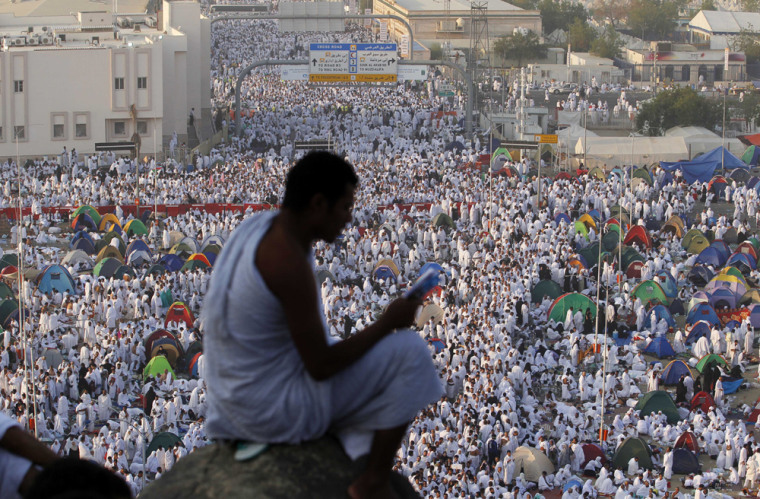Nearly three million Muslims performing the annual hajj pilgrimage in Saudi Arabia began making their way up the rocky desert Mount Arafat on Monday, chanting that they have come to answer God's call.
The white-robed pilgrims began their ascent at the crack of dawn, covering the Mountain of Mercy at Arafat in an endless sea of white as their chants "Labyek Allah," or "Here I am, God, answering your calling," reverberated overhead.
The climb at Arafat is one of the cornerstones of the pilgrimage, which is required from every able-bodied Muslim at least once in their lifetime.
It's the site where Islam's Prophet Muhammad delivered his farewell sermon and Muslims believe on this day the doors of heaven open to answer prayers and grant forgiveness.
As they began their climb from the tent-city in the valley, many of the pilgrims looked tired from lack of sleep, having spent the entire night praying.
Charities and vendors along the way handed out food packages and umbrellas to shield the climbers from the harsh sun.
'Like judgment day'
One of the pilgrims, Wassim Ahmad, from Mumbai, India, said this was his first hajj and that he felt like a child, reborn.
"Today is like judgment day," said the 29-year-old. "We have come to pray to God ... a new child has been born."
Alone and obviously on her first hajj, 46-year-old Egyptian, Um Sayed, kept asking people for directions.
"There is nothing greater than feeling that you are going to meet God," she said. "The whole body shivers."
Mina, Arafat and Muzdalifa are the three stops on the pilgrims' journey during the hajj, as worshippers trace the steps of Prophet Muhammad.
Islam is now embraced by a quarter of the world's population and m any wait for years to get a visa.
Despite this, the hajj draws millions of worshippers each year and the sheer numbers present a challenge in preventing stampedes at holy sites, fires in pilgrim encampments and the spread of disease.
Saudi Arabia has worked hard to improve facilities to ease the flow of pilgrims. In 2006, 362 people were crushed to death.
To minimize the risk of overcrowding and to lessen congestion on the roads the authorities are for the first time operating a Chinese-built train that will call at hajj sites.
Pilgrim trainThe $1.8 billion railway project will transport 180,000 passengers this year, Habib Zein Al Abideen, assistant minister for municipal and rural affairs, said.
"We will have a capacity of 72,000 passengers per hour next year. This year we operate at 35 percent capacity. Next year we could have 500,000 to 600,000 passengers," Abideen said.
Due to its limited capacity, the train will this year only carry residents of Saudi Arabia or other Gulf Arabs and next year will open to other nationalities, he said. "It will be big improvement. Tickets cost only a symbolic amount," said Walid al-Mushawer, a Saudi pilgrim.
There has been concern about possible attacks by al-Qaida during the hajj.
Asked whether the terror group might stage an attack on the hajj or use the event to try and get fighters from Yemen into the kingdom, Saudi Arabia interior minister, Prince Nayef bin Abdulaziz, said: "We cannot rule out any operation but we are ready to foil it."
However, al-Qaida in the Arabian Peninsula issued a statement on an Islamist website often used by militants saying it was "against any crimes against pilgrims ... Hajj is a pillar of Islam and we are most eager (not to spill) the blood of Muslims, wherever they may be."
In August 2009, an AQAP suicide bomber tried to kill Prince Muhammad bin Nayef, who heads Saudi Arabia's anti-terrorism campaign and is a member of the Saudi royal family.
In its statement, AQAP also condemned the U.S.-Saudi intelligence cooperation that led to the discovery of the parcel bomb plot.
"What proves that the Al Saud cooperates with and has full allegiance to the Americans and Jews is that they informed them about the explosive parcels, which were destined for the Jews and Americans," it said in the statement.
